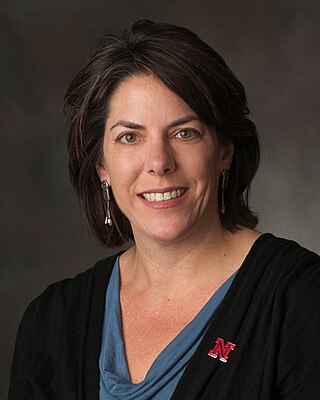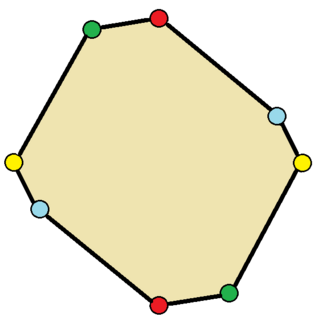Related Research Articles

A triangle is a polygon with three corners and three sides, one of the basic shapes in geometry. The corners, also called vertices, are zero-dimensional points while the sides connecting them, also called edges, are one-dimensional line segments. A triangle has three internal angles, each one bounded by a pair of adjacent edges; the sum of angles of a triangle always equals a straight angle. The triangle is a plane figure and its interior is a planar region. Sometimes an arbitrary edge is chosen to be the base, in which case the opposite vertex is called the apex; the shortest segment between base and apex is the height. The area of a triangle equals one-half the product of height and base length.

In Euclidean geometry, a kite is a quadrilateral with reflection symmetry across a diagonal. Because of this symmetry, a kite has two equal angles and two pairs of adjacent equal-length sides. Kites are also known as deltoids, but the word deltoid may also refer to a deltoid curve, an unrelated geometric object sometimes studied in connection with quadrilaterals. A kite may also be called a dart, particularly if it is not convex.

In geometry, an isosceles triangle is a triangle that has two sides of equal length. Sometimes it is specified as having exactly two sides of equal length, and sometimes as having at least two sides of equal length, the latter version thus including the equilateral triangle as a special case. Examples of isosceles triangles include the isosceles right triangle, the golden triangle, and the faces of bipyramids and certain Catalan solids.
Geometry is a branch of mathematics concerned with questions of shape, size, relative position of figures, and the properties of space. Geometry is one of the oldest mathematical sciences.
The Deborah and Franklin Tepper Haimo Awards for Distinguished College or University Teaching of Mathematics are awards given by the Mathematical Association of America to recognize college or university teachers "who have been widely recognized as extraordinarily successful and whose teaching effectiveness has been shown to have had influence beyond their own institutions." The Haimo awards are the highest teaching honor bestowed by the MAA. The awards were established in 1993 by Deborah Tepper Haimo and named after Haimo and her husband Franklin Haimo. After the first year of the award up to three awards are given every year.
Judith Victor Grabiner is an American mathematician and historian of mathematics, who is Flora Sanborn Pitzer Professor Emerita of Mathematics at Pitzer College, one of the Claremont Colleges. Her main interest is in mathematics in the eighteenth and nineteenth centuries.
In geometry, Monsky's theorem states that it is not possible to dissect a square into an odd number of triangles of equal area. In other words, a square does not have an odd equidissection.

In geometry, an equidissection is a partition of a polygon into triangles of equal area. The study of equidissections began in the late 1960s with Monsky's theorem, which states that a square cannot be equidissected into an odd number of triangles. In fact, most polygons cannot be equidissected at all.
In geometry, an affine-regular polygon or affinely regular polygon is a polygon that is related to a regular polygon by an affine transformation. Affine transformations include translations, uniform and non-uniform scaling, reflections, rotations, shears, and other similarities and some, but not all linear maps.

Judy Leavitt Walker is an American mathematician. She is the Aaron Douglas Professor of Mathematics at the University of Nebraska–Lincoln, where she chaired the mathematics department from 2012 through 2016 and currently serves as the Associate Vice Chancellor for Faculty Affairs. Her research is in the area of algebraic coding theory.

In geometry, a zonogon is a centrally-symmetric, convex polygon. Equivalently, it is a convex polygon whose sides can be grouped into parallel pairs with equal lengths and opposite orientations.
Deborah Tepper Haimo (1921–2007) was an American mathematician who became president of the Mathematical Association of America (MAA). Her research concerned "classical analysis, in particular, generalizations of the heat equation, special functions, and harmonic analysis".
Evelyn Marie Silvia was an American mathematician specializing in functional analysis and particularly in starlike functions. She was a professor at the University of California, Davis, and as well as teaching mathematics at the undergraduate and graduate levels there, was active in the improvement of secondary-school mathematics education.
Cynthia Jean Wyels is an American mathematician whose interests include linear algebra, combinatorics, and mathematics education, and who is known for her research in graph pebbling and radio coloring of graphs. She is a professor of mathematics at California State University Channel Islands (CSUCI) in Camarillo, California, where she also co-directs the Alliance for Minority Participation.
Sherman Kopald Stein is an American mathematician and an author of mathematics textbooks. He is a professor emeritus at the University of California, Davis. His writings have won the Lester R. Ford Award and the Beckenbach Book Prize.
Algebra and Tiling: Homomorphisms in the Service of Geometry is a mathematics textbook on the use of group theory to answer questions about tessellations and higher dimensional honeycombs, partitions of the Euclidean plane or higher-dimensional spaces into congruent tiles. It was written by Sherman K. Stein and Sándor Szabó, and published by the Mathematical Association of America as volume 25 of their Carus Mathematical Monographs series in 1994. It won the 1998 Beckenbach Book Prize, and was reprinted in paperback in 2008.

Bianca L. Viray is an American mathematician and professor at the University of Washington in Seattle. She works in arithmetic geometry, which is a blend of algebraic geometry and algebraic number theory.
Sonja Petrović is a Serbian-American statistician and associate professor in the Department of Applied Mathematics, College of Computing, at Illinois Institute of Technology. Her research is focused on mathematical statistics and algebraic statistics, applied and computational algebraic geometry and random graph (network) models. She was elected to the International Statistics Institute in 2015.

Yunqing Tang is a mathematician specialising in number theory and arithmetic geometry and an Assistant Professor at University of California, Berkeley. She was awarded the SASTRA Ramanujan Prize in 2022 for "having established, by herself and in collaboration, a number of striking results on some central problems in arithmetic geometry and number theory".
Adriana Julia Salerno Domínguez is a Venezuelan-American mathematician, a professor of mathematics at Bates College, and a program director at the National Science Foundation. Her research interests include arithmetic geometry and arithmetic dynamics in number theory. She is also a mathematics blogger, the co-founder of the American Mathematical Society blogs "Ph.D. plus epsilon" and "inclusion/exclusion".
References
- 1 2 Special to The Enterprise (17 September 2021), Elaine Ann Kasimatis
- ↑ Meet us, Department of Mathematics & Statistics, California State University, Sacramento, retrieved 2021-03-24
- 1 2 3 Hubert, Cynthia (5 February 2021), "Sac State professor honored as one of nation's best math educators", Newsroom, California State University, Sacramento, retrieved 2021-03-24
- ↑ Section Award for Distinguished College or University Teaching of Mathematics (PDF) (Presentation slides), Golden Section of the Mathematical Association of America, 29 February 2020, retrieved 2021-03-24
- ↑ Elaine Kasimatis at the Mathematics Genealogy Project
- ↑ Stein, Sherman K.; Szabó, Sándor (2008), Algebra and Tiling: Homomorphisms in the Service of Geometry, Carus Mathematical Monographs, vol. 25, Mathematical Association of America, p. 120, ISBN 978-0-88385-041-1, Zbl 0930.52003
- ↑ "Citation: Elaine Kasimatis, California State University, Sacramento" (PDF), 2021 Haimo Awards, Mathematical Association of America, retrieved 2021-03-24